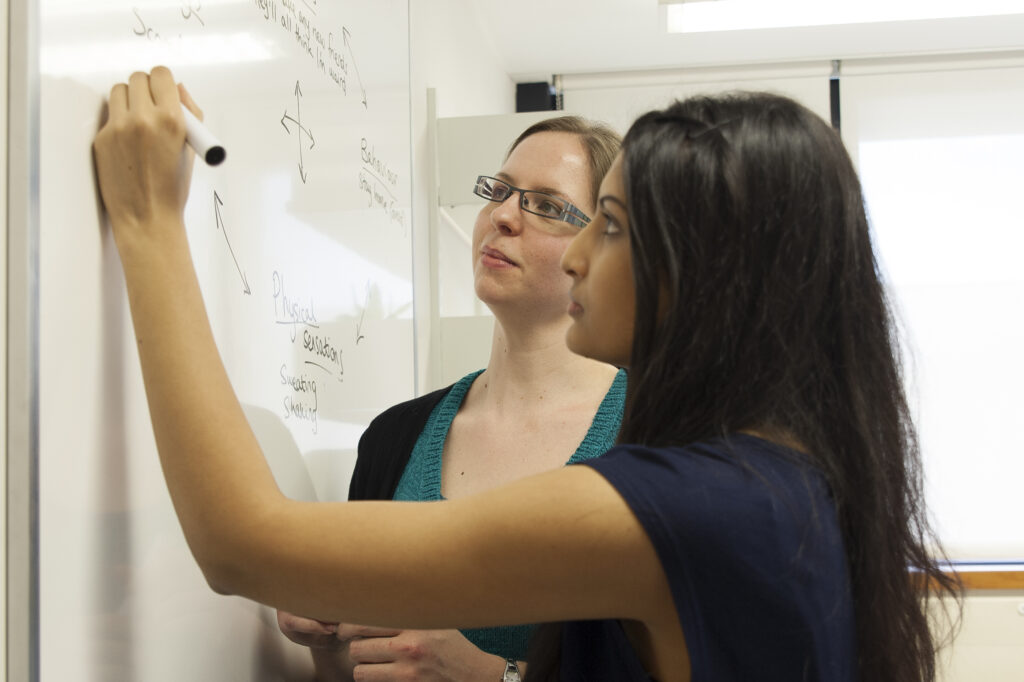By: Natalie Meek, n.a.meek@reading.ac.uk & Fisayo Adunola, f.adunola@reading.ac.uk, School of Psychology & Clinical Language Sciences

Overview
Academic tutors across the Charlie Waller Institute (CWI) courses recognised that disabled students faced specific challenges during their studies. Respecting the diverse voices of our student body is paramount, as noted within the student charter. As such we developed student led forum to access feedback and to enact change within courses. In this report we will reflect on the learning taken, and challenges met in engaging students with disabilities.
Objectives
- Support students with disabilities.
- Supporting students to have a reflective space to discuss respective challenges faced and to enable them to support one another and discuss helpful ways to cope.
- Enact change within CWI courses, and in wider educational settings, based on student feedback.
Context
The CWI offers graduate and postgraduate clinical training courses. We have been receiving feedback from our disabled students that they were facing additional barriers and challenges in completing their courses. One area of feedback was feeling isolated within their peer group, and assessments and processes being less accessible to them.
Implementation
The group was to cover all areas of disability; neurodivergence, learning difficulties, physical, sensory and mobility disabilities. So far five groups have been conducted in the previous academic year, sadly attendance has been very low, three groups were conducted with only one student present. Although this meant a great listening space for that student, and an opportunity for the school to take direct feedback, there is little opportunity for peer support. We have identified several challenges to developing peer support groups for post-graduate training course cohorts. On the same day that our forum runs there are two other forums which are the Diversity and Inclusion (D&I) student forum and the Parent and Carers student forum. There has been some cross over as some of the trainees that have attended one forum have attended other forums.
Impact
So far, the forum has met each objective in part. However, one challenge that has arisen is attendance at the forum which has meant the reach hasn’t gone beyond a small number of students. This is a challenge we are continuing to work on as a school to enabled more disabled students to access this space. The reach of the group has also gone beyond the University or School, with contact being made with an accreditation body to respond to student feedback. An unexpected impact has been to enable undiagnosed neurodivergent students to access support through their attendance at the forum. One take away is the importance of students having more contact with the Disability Representatives (Dis Reps) and Disability Advisory Service (DAS), which this group has facilitated. In their role of Dis Rep, Natalie can offer further individual support to enable students to have further reasonable adjustments in university study and in professional service.
Reflections
Despite low turnout, facilitating the forums has been insightful in hearing the voices of students who often face barriers to social engagement within higher education and within wider society (McGuckin et al., 2013; Watson & Nolan, 2011). Our students face unique challenges due to the pressures of clinical training, which impacts their personal, professional, and educational lives. Challenges have varied from accessibility of buildings to difficulties with information processing.
Disabled students are not a monolith, so continuing engagement with diverse voices is necessary to understand our students’ strengths and challenges. The title of the group may be a barrier to engagement, the disability label holds stigma, and those with invisible disabilities may not identify with this label.
In addition to university related learning, our students have expanded on how larger systems, such as the health service and accrediting bodies, lack accessibility. This led to liaison with the British Association of Behavioural & Cognitive Psychotherapies (BABCP). We hope this forum will empower our students to engage equitably in our courses.
Follow up
Within CWI we have Diversity and Inclusion Support Officers (DISOs) who have been active in ensuring that the actions from the student forums are followed up and embedded within the direction of CWI. The forums are continuing throughout the 2023/24 academic year, we plan to continue responding to student feedback to facilitate engagement. A further review will be performed at the end of the 2023/24 academic year.
References
- Scope. (2023). Disability facts and figures. https://www.scope.org.uk/media/disability-facts-figures/
- HESA. (2023). Table 4 – HE student enrolments by HE provider and disability marker 2014/15 to 2021/22. https://www.hesa.ac.uk/data-and-analysis/students/table-4
- House of Commons Library. (2021). Support for disabled students in higher education in England.https://commonslibrary.parliament.uk/research-briefings/cbp-8716/
- McGuckin, C., Shevlin, M., Bell, S., & Devecchi, C. (2013). Moving to further and higher education: An exploration of the experiences of students with special educational needs. NCSE.
- Watson, D., & Nolan, B. (2011). A social portrait of people with disabilities in Ireland. Department of Social Protection.